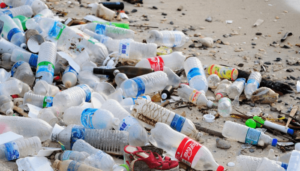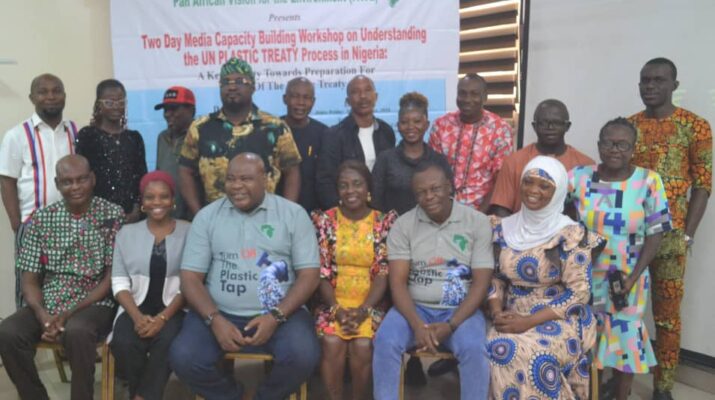As the world becomes constantly inundated with plastic wastes, environmentalists call attention to the fact that if not urgently contained, plastic pollution might soon overtake gas flares and crude oil spills globally as countries struggle to combat the climate crisis
By Edu Abade
Globally, all countries are now challenged and populated by plastic wastes. And so, from fishermen catching more plastics in the sea, plastics finding their way into men’s semen and the belly of fishes, plastics in the water bodies, gutters and on the streets of cities, urban and rural areas, the plastic pollution menace has generally become a huge burden to the environment worldwide.
Plastics are said to contain a mix of over 16,000 different chemicals of which at least 4,200 (or 26 percent) are highly hazardous to human and environmental health, according to an international team of scientists with the PlastChem Project.
This means that they are officially recognized to be toxic, persistent or have other concerning properties such as leaching into our food, homes, and the environment, adversely affecting human health and the environment.
This was the submission of environmental activists at the end of a capacity building workshop for journalists and civil society groups in Lagos with the theme: Understanding the United Nations Plastic Treaty Process in Nigeria: A Key Activity Towards Preparation for INC-5 of the Plastic Treaty.
President of the Pan African Vision for the Environment (PAVE), AnthonyAkpan, who presented a paper on The Plastic Age alerted to the fact that global plastics policy outlook scenarios to 2060 look unfavourable, insisting that the use of plastics could almost triple globally, while the Organisation for Economic Cooperation and Development (OECD) countries are projected to double their plastics use, the largest increases are expected in emerging economies in Sub-Saharan Africa and Asia.
He revealed that plastic waste is also projected to almost triple by 2060, with half of all plastic waste still being land-filled and less than a fifth recycled, adding that plastic leakage onto the environment is projected to double to 44 million tons (Mt) yearly, while the build-up of plastics in aquatic environments will more than triple, thereby exacerbating environmental and health impacts.
At the training supported by the Global Greengrants Fund, Global Alliance for Incineration Alternatives (GAIA), Sustainable Research and Action for Environmental Development (SRADev Nigeria), Break Free From Plastics (BFFP) and Renevlyn Development Initiative (RDI), Akpan explained that plastic waste pollution has been majorly caused by the petrochemical industry, which has flooded the world with plastics in the name of convenience, progressiveness and human desirability.
“Currently 6 percent of total oil production is used by the plastic sector and it is estimated that it will represent 20 percent by 2050! Most of plastic’s worst impacts, such as greenhouse gas emissions and toxic air emissions occur primarily in the production phase. If the lifecycle of plastics were a country, it would be the fifth largest greenhouse gas emitter on Earth!
“Other challenges, such as the transfer of toxic compounds into food, happen in the use-phase, while non-recyclability of most plastics is an end-of-life issue,” he stated.
On the Plastic Treaty, he explained that it has been in the making for five years, adding that successive efforts since the third meeting of the United Nations Environment Assembly (UNEA3) in 2017, culminated in UNEA resolution 5/14 (2022). Resolution 5/14 establishes an Intergovernmental Negotiations Committee (INC) to negotiate a legally-binding treaty “on plastic pollution, including in the marine environment based on a comprehensive approach that addresses the full life cycle of plastic.”
“Treaties are negotiated between governments – we NGOs are observers, and can only make suggestions, but cannot directly propose or oppose text. The institutional makeup is still undetermined but one option is a treaty that would have a mix of global obligations and national action plans.
“Once the treaty is finalized, countries will have the option to ratify it or not. If they do, there’s an opportunity to strengthen and harmonize national regulations to combat plastic pollution, towards a common global goal-global common ground. Countries remain free to legislate on additional or more ambitious controls,” he stated.
Akpan further maintained that the treaty matters because it presents an opportunity to address what national regulations cannot: global plastic production, global plastic pollution, global finance to tackle plastic pollution and would serve as a global avenue to unlock systemic change away from plastics at pace and scale.
He also noted that the treaty would be an opportunity to create an international framework to address plastic across its life cycle, insisting that a solid treaty could push the entire petrochemical, plastic and Fast Moving Consumer Goods Companies (FMCGs) industry to shift towards reuse and environmentally sound design just as it has the potential of holding all signing countries to a high common minimum standard of action.
On his part, Programmes Manager of SRADev Nigeria, Victor Fabunmi, who presented a paper on Emerging Plastic Bans in Africa and Nigeria, explained that plastics constitute a wide range of semi-synthetic or synthetic substances that contains organic polymers like polyvinyl chloride (PVC), polyethylene, nylon as their main ingredient.
“Some types of plastic includes Polyethylene terephthalate (PET); High-density Polyethylene(HDPE); Polyvinyl chloride(PVC); Low-density Polyethylene(LDPE); Polypropylene (PP); Polystyrene: Others: Acrylonitrile butadiene styrene (ABS), Poly carbonate (PC), Polyurethane (PUR), Bisphenol A (BPA)
“Plastics play a vital role in our economy and daily lives. However, the rapid increase in their production and consumption over recent decades has significantly impacted the environment and posed serious risks to human health.
“Globally, over 400 million tons of plastic are produced annually with an estimated 19-23 million tons ending up in lakes, rivers and seas. However, less than 10 percent of the world’s annual plastic production is recycled,” he stated.
Speaking further, he cited a 2017 United Nations report saying: “Each year, over 8 million tons of plastic end up in the ocean, wreaking havoc on marine wildlife, fisheries and tourism and marine ecosystem.
“A 2023 World Health Organisation (WHO) report showed that in Africa where production of only 5 percent and consumption of 4 percent of the global plastic take place, growing population and urbanization are driving an increase in single-use plastics, thereby heightening environmental pollution and health threats.”




